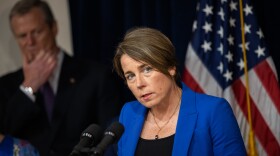The Massachusetts House Ways and Means Committee last week released a $49.6 billion state budget. The proposal mirrors Gov. Charlie Baker's budget plan with a 2.7% increase in unrestricted aid for local governments. But there are some significant differences.
NEPM’s Adam Frenier asked State House New Service’s Matt Murphy what some of the sticking points might be.
Matt Murphy, State House News Service: You know, we'll see where some of the sticking points emerge. But what this bill does is spend more than the governor because the federal government has not yet ended the pandemic state of emergency in the country. The House proposing this budget and frankly needing to up the MassHealth line item to cover health insurance moving forward, a lot of that will be covered by federal reimbursements. But they're also taking the fact that the state is seeing record collections in taxes and using it to spend more on things like rental assistance, housing and other areas of this state budget.
What it doesn't do and what we know is one of the big sticking points and fighting points, at least between the governor and the House will be, is that there are no tax breaks in this bill. The House is choosing to invest the windfall that the state is seeing, on things like education and salaries for early educators, rather than adopt any of the $700 million and tax cuts that the governor proposed in his budget back in January.
Adam Frenier, NEPM: Inflation is at a 40 year high. That means things state government buys are going to cost more. Is this going to add some tension to the budget process this year?
Well, it's certainly going to factor in. If you think about what the state spends its money on and you look at things like gas prices, it's certainly adding to the bottom line of agencies like the MBTA, but not just public transit agencies. A lot of different state programs and agencies have fleets of vehicles that they rely on. This is going to drive up prices there. So if there's a level funded line item, the dollar is not going to stretch as far.
Luckily for lawmakers, they're sitting on a cash pile that they're looking to spend right now. They're not looking at tightening their belts. So that will ease some of the tension and pressure on what could be an argument over how to spend scarce resources.
The budget process sometimes in Massachusetts drags out well beyond its deadline or its posted deadline. Is there any sense that there's some urgency from lawmakers to get this thing done on time this year, or could this go into the fall again?
It certainly seems like they're back to their old ways on Beacon Hill and they will try to get this budget done by July 1st. That is the start of the new fiscal year. But I would not be surprised to see this trickle over again. This is the second year of a two-year session and over the next couple of months we're going to see a lot of issues start to pile up and it tends to all come to a head together.
So, I wouldn't be surprised to see talks over this budget still into July, talks over other issues like climate change and how to spend money to shore up cities and towns against rising tides and other impacts from climate change. The House and Senate offering very different approaches there. Health care (is) another big topic. But one thing we know is this session will come to an end at the end of July. So, everything must be done by then.
Shifting gears, Matt, I want to quote something that you wrote recently: "The Massachusetts Republican Party convention is four weeks away, but Governor Charlie Baker is not worried about booking a hotel room in Springfield because he's not going and the lieutenant governor is not attending either. So has there been any fallout from that?
I think as much as it is maybe a shock that a sitting Republican governor or a governor of any party who continues to be popular would not attend his party's convention as they're looking to nominate their next candidate. Of course, at this convention, it will be determined whether or not the party endorses a new Republican to succeed Governor Baker, and whether or not the two vying to succeed him actually can qualify for the ballot. That's Geoff Diehl and Chris Doughty.
But if you really think about this, this makes a lot of sense. The governor has been drifting away from the GOP for quite some time. And if you look at the speakers that they have invited, former director of ICE, a very pro-life advocate. These are not things that Governor Charlie Baker has stood for while he's been in office. And it shows just how far the governor's brand of moderate Republicanism and the conservative bent that the party has adopted in recent years have drifted apart.







